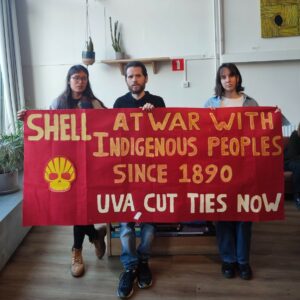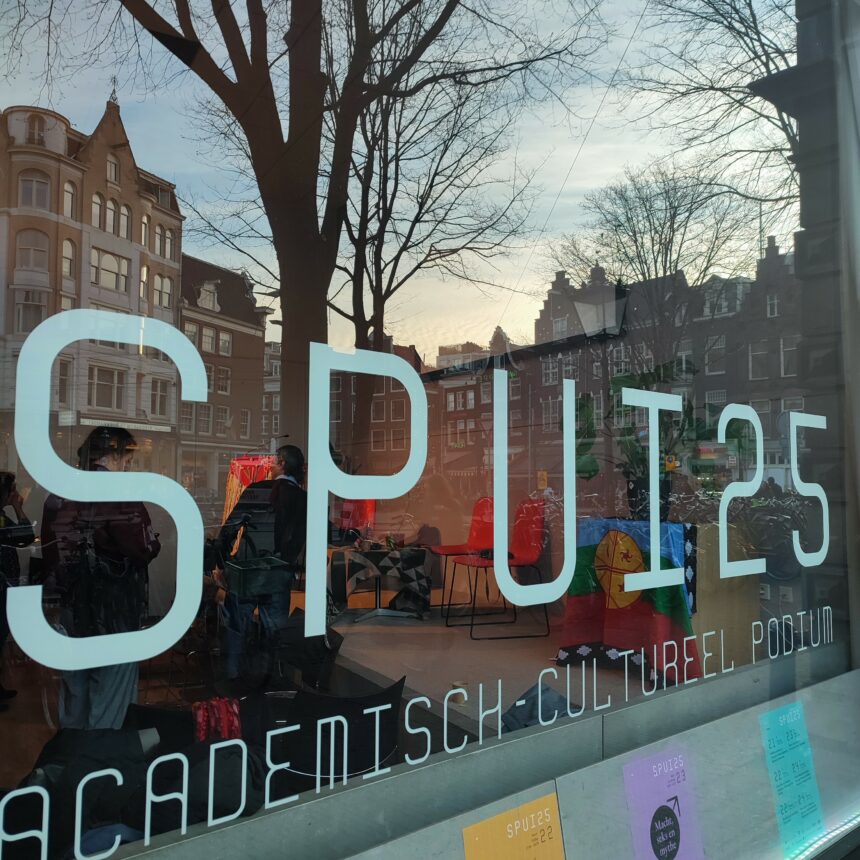Under the motto “The point is not to become a leader, but to empower others”, the Week Against Racism in the UvA challenges Western customs and values that still linger from the “dark part of History, better known as Colonialism. Starting on the 14th of March, the week consisted of various talks that dive into the concept of inclusivity and how to approach it from a community-oriented perspective.
On the 15th of March, the discussion focused on “Indigenous Knowledge in Academia”, a talk held at SPUI 25 by Myra Colis, Chautuileo Tranamil, and Willem Koning. Myra is the founder of MABIKAS, a foundation that aims to preserve indigenous knowledge and societies survive in an increasingly globalized world. Chautuileo Tranamil, another one of the speakers, is a Mapuche- Pewenche from Chile, a political scientist with an MSc in International Relations, and an expert in Conflict Studies. Lastly, Willem Koning of both Kalinja (Carib-Surinam) and Dutch ancestry, is an accomplished painter, musician, and activist. He contributed to the conversation with interdisciplinary insights into the protection of Indigenous cultures of the Americas, especially Suriname.
But what does it mean to talk about Indigenous people in Academia? Unfortunately, the matter is way too often relegated to historical accounts of only a few niche groups that root the conversation firmly in the past tense. However, as the conversation makes it clear, indigenous cultures are an indispensable current topic of conversation- positioning it in the past and romanticizing the concept of Indigenous knowledge does not allow us to truly face the fact that we need to further insist in its integration in Academia.
For Willem, this means cultivating roots that are not connected to Europe, especially in regards to language and how languages such as English have been forcefully imposed on colonized communities, which, aligned with the purposes of the discussion, raises the question of the validity of language. Also, according to Chautuileo, Indigenous Knowledge is a set of values and principles set forth by their ancestors. She emphasizes her point by drawing attention to the similarity between the audience, listening attentively to the conversation held in SPUI 25, and the way her people listen to the elderly. This is common for communities in which the oral tradition and storytelling are still deeply valued ways of educating. “We start to lose our values” Chautuileo stated, due to the modern obsession with individuality over a moral cosmovision that seeks balance and aims to give back.
Still, the question “why does it matter?” remains a relevant part of the conversation. The discovery and colonization of indigenous tribes offered colonists access to a wealth of knowledge that still remains relevant today. However, it implied the creation of something far more enduring and dangerous: Identity. A Western identity created at the expense of the Other. Myra and Willem draw attention to the concept of medicinal knowledge, which is closely linked to linguistics. The names given to these newly found species were Latin, appropriating the knowledge of Indigenous communities, usually for the purpose of economic gain. Willem talks about how the question of money in his ancestors’ community was considered inappropriate when it came to medical treatment. This places Indigenous knowledge as being intrinsically linked with respect for life, nature, and their own communities. Furthermore, Chautuileo reminds us, a large part of what is considered to be knowledge nowadays has been constructed over “a story of tears”, through the gaze of Western philosophers and scientists who dehumanized and appropriated Indigenous knowledge. Myra adds that it is important to ask: “Why are these books (about native communities) written by Westerners and not Indigenous people?”- the answer is disturbingly clear: because of a system of beliefs based on taking and never giving back.
As part of the integration of Indigenous knowledge, we must ask ourselves if we would rather belong to rather than possess belongings. Chautuileo points this out: we should be drawn to giving back: giving back love, guidance, and knowledge. Furthermore, in the rare cases when Indigenous knowledge is properly acquired and not appropriated, it is important to also consider conditions in which this knowledge is shared. Chautuileo declares she feels used when she is asked to discuss indigenous knowledge but she is dismissed from other fields such as climate change, in which she has just as much expertise. As was made clear in the talk, this needs to be addressed because real integration of Indigenous knowledge cannot be accomplished in a system that only asks questions out of curiosity, and quickly dismisses any answer it may not want to hear.
Lastly, questions such as “who is telling the story?” and “what is the other side of the story?” should be asked as many times as necessary to understand its real impact. A call for action from the speakers clarified that it is time to take responsibility for the present by rewriting the history we have been taught through the implementation of these concepts in our daily lives.


